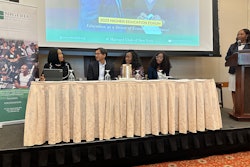
Having grown up in predominantly Hispanic Los Banos, Calif., Parras missed being surrounded by Spanish-speakers from his own culture. He also missed his relatives, some of whom could not understand why he chose to travel more than 5,000 miles to work toward his college degree.
Samantha Rios-Arizala had to struggle financially to afford the cost of studying in Tokyo, but believes the experience will enrich her life enough to make the extra effort worthwhile.
“In Mexican culture, family is very important,” said Parras, who is studying international business at Temple University’s campus in Tokyo. “The fact that I am so far away hurts them and it hurts me. But it’s for my future, and they understand that.”
Parras said he transferred to Temple in Japan in the hope that mastering Japanese would be helpful for a career in business. A military veteran, he said he also thought the Japanese way of life would resemble military culture in an important way. “There’s a certain respect for authority that you show in both places,” he said.
The number of Americans studying abroad has tripled over the last two decades, as students increasingly see the academic, social and professional advantages of overseas experiences, and university officials shore up their international programs in response.
But, for both cultural and financial reasons, it’s an opportunity first-generation and minority college students like Parras are less likely to get.




















